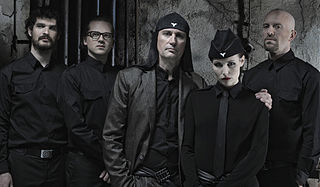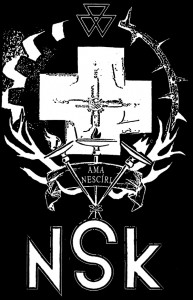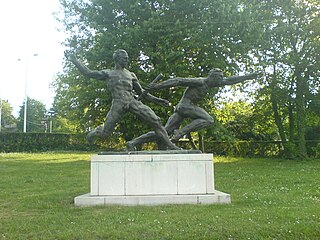Related Research Articles

Henri-Robert-Marcel Duchamp was a French painter, sculptor, chess player, and writer whose work is associated with Cubism, Dada, and conceptual art. He is commonly regarded, along with Pablo Picasso and Henri Matisse, as one of the three artists who helped to define the revolutionary developments in the plastic arts in the opening decades of the 20th century, responsible for significant developments in painting and sculpture. He has had an immense impact on 20th- and 21st-century art, and a seminal influence on the development of conceptual art. By the time of World War I, he had rejected the work of many of his fellow artists as "retinal", intended only to please the eye. Instead, he wanted to use art to serve the mind.

Laibach is a Slovenian and Yugoslav avant-garde music group associated with the industrial, martial, and neo-classical genres. Formed in the mining town of Trbovlje in 1980, Laibach represents the musical wing of the Neue Slowenische Kunst (NSK) collective, a group which Laibach helped found in 1984.

Neue Slowenische Kunst is a political art collective that formed in Slovenia in 1984, when the Socialist Republic of Slovenia was part of Socialist Federal Republic of Yugoslavia. NSK's name was chosen to reflect the theme in its works of the complicated relationship Slovenes have had with Germans. The name of NSK's music wing, Laibach, is also the German name of the Slovene capital Ljubljana. The name created controversy because some felt it evoked memories of the Nazi annexation of Slovenia during the Second World War. It also refers to Slovenia's previous seven centuries as part of the Habsburg monarchy.
Netochka Nezvanova is the pseudonym used by the author(s) of nato.0+55+3d, a real-time, modular, video and multi-media processing environment. Alternate aliases include "=cw4t7abs", "punktprotokol", "0f0003", "maschinenkunst", "integer", and "antiorp". The name itself is adopted from the main character of Fyodor Dostoyevsky's first novel Netochka Nezvanova (1849) and translates as "nameless nobody."
In the minds of many foreigners, Slovenian folk music means a form of polka that is still popular today, especially among expatriates and their descendants. However, there are many styles of Slovenian folk music beyond polka and waltz. Kolo, lender, štajeriš, mafrine and šaltin are a few of the traditional music styles and dances.
Noordung are a Slovenian theatre group; founded in 1983 under the name of Scipion Nasice Sisters Theatre they were, in 1984, a founding member of the Neue Slowenische Kunst collective. They were also known 1987–1990 as Red Pilot Theater.
New wave in Yugoslavia was the new wave music scene of the Socialist Federal Republic of Yugoslavia. As its counterparts, the British and the American new wave, from which the main influences came, the Yugoslav scene was also closely related to punk rock, ska, reggae, 2 Tone, power pop and mod revival. Some of its acts are also counted as belonging to the Yugoslav punk scene which already existed prior to new wave. Such artists were labeled as both punk rock and new wave.

The Relay of Youth was a symbolic relay race held in Socialist Federal Republic of Yugoslavia every year. The relay carried a baton with a birthday pledge to Josip Broz Tito ostensibly from all young people of Yugoslavia. The race usually started in Tito's birth town Kumrovec and went through all major towns and cities of the country. It ended in Belgrade at JNA Stadium on May 25, Tito's official birthday and Day of Youth, a national holiday.
Mladina is a Slovenian weekly left-wing political and current affairs magazine. Since the 1920s, when it was first published, it has become a voice of protest against those in power. Today, Mladina's weekly issues are distributed throughout the country. Mladina is considered one of the most influential political magazines in Slovenia.

Predictions of Fire or Prerokbe ognja is a 1996 documentary film by American filmmaker Michael Benson about Neue Slowenische Kunst.
Igor Vidmar is a prominent Slovenian and former Yugoslav journalist, rock music promoter and manager, music producer and political activist.
Inke Arns is a German curator and theorist known for her works focusing on media arts.
Afterall is a nonprofit contemporary art research and publishing organisation. It is based in London, at Central St Martins College of Art & Design. It publishes the journal Afterall; the book series Readers,One Works and Exhibition Histories.

Dragan Živadinov, is a Slovenian theatre director.
Charles Wing Krafft was an American painter and ceramicist whose later work incorporated traditional ceramic decorative styles to produce works commemorating modern disasters. In 1998, he was called "the dark angel of Seattle art" by the art critic of the Seattle Post-Intelligencer. In early 2013 it was revealed that he participated in white nationalist and Holocaust denial websites, which led to a re-evaluation of his artwork.

Zdenka Badovinac is a curator and writer, was the director of the Museum of Contemporary Art Zagreb, Croatia. She served between 1993 and 2021 as director of the Museum of Modern Art in Ljubljana, comprised since 2011 of two locations: the Museum of Modern Art and the Metelkova Museum of Contemporary Art in Metelkova, an autonomous art, culture, and social center in Ljubljana. In 2022, she was appointed director of the Museum of Contemporary Art in Zagreb. She resigned from her position in the fall of 2023 due to personal reasons. She returned to Ljubljana, where she currently works as an independent curator, author and international consultan
Fuck for the Heir Puppy Bear! was a political-artistic performance staged by Russian performance group Voina at the Timiryazev State Biological Museum in Moscow in February 2008.
Subversive affirmation is an artistic performance that overemphasizes prevailing ideologies and thereby calls them into question. Simultaneously with affirmation, the affirmed concepts are revealed, and artists distance themselves from those concepts. Strategies of subversive affirmation include "over-identification", "over-affirmation" and "yes revolution".

Europe Today is a theatre show produced in cooperation between East West Theatre Company and Slovene National Theatre. The show is based on an essay written by Miroslav Krleza and directed by Haris Pasovic. Production also included Miki Manojlovic, an actor; Edward Clug, a contemporary dancer and choreographer; as well as the industrial, neoclassical band Laibach. The dramaturgy of the production was done by Dubravka Vrgoc, director of Zagreb Youth Theatre. The artists, who reside in Slovenia, Serbia, Bosnia and Herzegovina and Croatia, rehearsed in Maribor's Slovene National Theatre during February 2011. The show opened February 16 and it provoked great regional and international interest.
The Scipion Nasice Sisters Theatre was founded on 13 October 1983 in Ljubljana by Eda Čufer, Dragan Živadinov and Miran Mohar, three Slovenian students.
References
- Arns, Inke (2002). Neue Slowenische Kunst (NSK) - eine Analyse ihrer kuenstlerischen Strategien im Kontext der 1980er Jahre in Jugoslawien. Museum Ostdeutsche Galerie, Regensburg. ISBN 961-90851-1-6.
- Arns, Inke, ed. (2003). Irwin: Retroprincip 1983-2003. Frankfurt/Main: Revolver - Archiv für aktuelle Kunst. ISBN 3-936919-56-9.
- Monroe, Alexei (2005). Interrogation Machine: Laibach and NSK . The MIT Press. ISBN 978-0-262-63315-4.